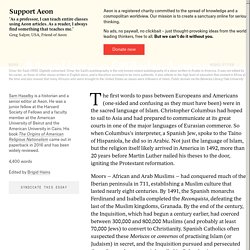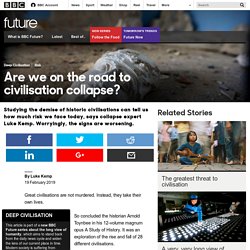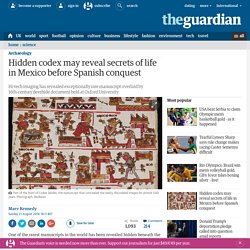

Exclusive: Hong Kong public libraries purge 29 titles about the Tiananmen Massacre from the shelves - Hong Kong Free Press HKFP. Hong Kong public libraries over the past 12 years have removed 29 out of 149 books about the Tiananmen Massacre from their shelves, a total of 263 individual copies, a review by HKFP has found.

Of the 120 titles still stocked, just 26 are displayed on the shelves and immediately available for borrowing. The remaining 94 are only available on request, are stored in off-site book reserves, or are housed in reference sections where they can be read but not borrowed. Civil rights in America: How 1961 changed the course of US history. Walking a picket line, sitting at a lunch counter, asking for a book in a library: It could get them arrested, beaten or killed.

They did it anyway. It was 1961, and across the South, college students, faith leaders, shop owners, high school students, civil rights leaders and many others risked their lives to battle white supremacy. They wanted voting rights and the integration of schools, businesses, public transit and libraries. They lost their jobs, were kicked out of school. Their bodies were bloodied and battered. For "Seven Days of 1961," reporters across the USA TODAY Network retraced crucial moments that set in motion a new era of civil rights that continues to inform social justice movements today. The Bomb Didn’t Beat Japan … Stalin Did. The U.S. use of nuclear weapons against Japan during World War II has long been a subject of emotional debate.

Initially, few questioned President Truman’s decision to drop two atomic bombs, on Hiroshima and Nagasaki. But, in 1965, historian Gar Alperovitz argued that, although the bombs did force an immediate end to the war, Japan’s leaders had wanted to surrender anyway and likely would have done so before the American invasion planned for November 1. Their use was, therefore, unnecessary. Obviously, if the bombings weren’t necessary to win the war, then bombing Hiroshima and Nagasaki was wrong.
One Woman’s Mission to Rewrite Nazi History on Wikipedia. Primary Sources. Slavery past & present. US. Contemporary History. The construction of Panama Canal in rare pictures, 1881-1914 - Rare Historical Photos. Early British History.
Asia.
Moving Photos Showing The Liberation Of Concentration Camps During WWII. The Holocaust was a tragic and inhumane event during which an estimated 6 million Jews were killed for their ethnicity and religion.

Was the Lone Ranger Black? The Fight to Resurrect the Legacy of Bass Reeves. The story begins in 1884, on a stormy day in June.

Two men on horseback are traveling through the Chickasaw Nation, in what is today southern Oklahoma, moving southwest among the timbered hills and rocky outcrops of the Arbuckle Mountains. Mud-splattered and road-weary, the riders have covered nearly two hundred miles in the days since they set out from the federal courthouse in Fort Smith, Arkansas. A windstorm the day before had kicked up dust so thick that folks in a nearby town along the Red River claimed it was impossible to see farther than twenty yards.
History Visualised - Timelines- photos. digital info. Muslims lived in America before Protestantism even existed. The first words to pass between Europeans and Americans (one-sided and confusing as they must have been) were in the sacred language of Islam.

Christopher Columbus had hoped to sail to Asia and had prepared to communicate at its great courts in one of the major languages of Eurasian commerce. Ancient Society Research Resources.
History of colonisation and decolonization. Columbus, de Gama, and Zheng He! 15th Century Mariners. Crash Course: World History #21. A Brief History of Pickles. Is there an alternate timeline where America is known as the United States of the Pickle-Dealer?

It seems unlikely, but there’s an element of truth to this half-sour hypothetical. Amerigo Vespucci didn’t discover the Americas, contrary to what the map-makers who named the continents believed, but his given name did end up lending itself to the so-called “new world.” And Ralph Waldo Emerson once called Vespucci “the pickle-dealer at Seville,” a derisive label that may have stretched the truth a bit, but pointed towards a very real part of the itinerant Italian’s biography. Before traveling to the New World himself, Vespucci worked as a ship chandler—someone who sold supplies to seafaring merchants and explorers.
These supplies included foods like meat, fish, and vegetables that had been pickled, which meant they would stay preserved beneath a ship’s deck for months. And pickles weren’t just enjoyed by 15th century sailors. BBC Radio 4 - A History of the World in 100 Objects. 30 Years After Tiananmen, a Chinese Military Insider Warns: Never Forget. The ancient fabric that no one knows how to make - BBC Future. Future - Are we on the road to civilisation collapse? Great civilisations are not murdered.

Instead, they take their own lives. Famous Speeches in History — Audio Online - History.com. Lessons From McGraw Hill: The Eurocentric Influence on History Textbooks and Classrooms. Earlier this month, McGraw Hill found itself at the center of some rather embarrassing press after a photo showing a page from one of its high-school world-geography textbooks was disseminated on social media.

The page features a seemingly innocuous polychromatic map of the United States, broken up into thousands of counties, as part of a lesson on the country’s immigration patterns: Different colors correspond with various ancestral groups, and the color assigned to each county indicates its largest ethnic representation. The page is scarce on words aside from an introductory summary and three text bubbles explaining specific trends—for example, that Mexico accounts for the largest share of U.S. immigrants today. The recent blunder has to do with one bubble in particular. Hidden codex may reveal secrets of life in Mexico before Spanish conquest. One of the rarest manuscripts in the world has been revealed hidden beneath the pages of an equally rare but later Mexican codex, thanks to hi-tech imaging techniques.

The Codex Selden, a book of concertina-folded pages made out of a five-metre strip of deerhide, is one of a handful of illustrated books of history and mythology that survived wholesale destruction by Spanish conquerors and missionaries in the 16th century. Researchers using hyperspectral imaging, a technique originally used for geological research and astrophysics, discovered the underlying images hidden beneath a layer of gesso, a plaster made from ground gypsum and chalk, without damaging the priceless later manuscript. The underlying images must be older than the codex on top, which is believed to have been made about 1560 and was donated to Oxford’s Bodleian library in the 17th century by the scholar and collector John Selden.
100,000,000 Years From Now. How Islam Created Europe. Europe was essentially defined by Islam. And Islam is redefining it now. For centuries in early and middle antiquity, Europe meant the world surrounding the Mediterranean, or Mare Nostrum (“Our Sea”), as the Romans famously called it. It included North Africa. Top 15 Most Powerful Women in History. A number of powerful women have shaped the course of history with their intelligence, strength, passion, and leadership qualities. They have challenged the status quo, made lasting reforms, and many have presided over their countries for decades, ushering in prosperity and cultural revolutions. While this list is certainly subjective, it tries to take into account the actual power and the impact of each person. Notably, the United Kingdom has three entries in the top ten, an eye-catching fact, considering that a monarchy managed to achieve such a feminist feat, and yet the United States, which always considered itself as the most advanced democratic society ever, hasn’t been able to elect a female leader in all of its independent existence so far. 15.
Europe's Famed Bog Bodies Are Starting to Reveal Their Secrets. If you’re looking for the middle of nowhere, the Bjaeldskovdal bog is a good place to start. It lies six miles outside the small town of Silkeborg in the middle of Denmark’s flat, sparse Jutland peninsula. The bog itself is little more than a spongy carpet of moss, with a few sad trees poking out. An ethereal stillness hangs over it. A child would put it more simply: This place is really spooky.
Arabian, Hindi & Persian (pre Iraq & Iran) Rome. Rome In The 1st Century - Episode 1: Order From Chaos (ANCIENT HISTORY DOCUMENTARY) All hail the humble moss, bringer of oxygen and life to Earth. Scientists have identified the creature that gave the Earth its first breath of fresh, clean air and made life possible for everything ranging from ardvaarks to Olympic athletes and zebra finches. It was a moss. The drama unfolded more than 400 million years ago and there are no surviving witnesses. Shock: The First Crusade and the Conquest of Jerusalem. Big History theories pose latest challenge to traditional curriculum. A provocative new theory of history which has won influential support from Bill Gates poses the latest challenge to the coalition government plans to return to a traditional school curriculum. Big History, a movement spearheaded by the Oxford-educated maverick historian David Christian, is based on the idea that the academic study of the past can no longer be carried out from a nationalist perspective.
Christian and his acolytes argue that the discipline will progress only once it charts human activity with a global scope, looking at chains of cause and effect that do not respect national borders. Where did Russia come from? - Alex Gendler. Who's Who in Medieval History and the Renaissance. The "Who's Who in Medieval History" project is intended to help you find information about significant individuals from the Middle Ages and Renaissance, when available, on the web and in print. Each page will offer a brief explanation of who the individual was and why he or she is important or interesting in medieval and Renaissance studies.
BBC Masterpieces of the British Museum - The Assyrian Lion Hunt Reliefs. Thirteenvirtues.com. Sweden pays for grim past. After years of denial, Sweden began moves yesterday to compensate thousands of citizens sterilised in a grim social experiment in eugenics which lasted more than 40 years. Stockholm's social affairs ministry announced it would pay up to £13,430 to each surviving victim of the 1934-76 programme.
The decision follows the report in January of an official commission set up in the wake of newspaper reports in 1997 that up to 63,000 people - 90 per cent of them women - were sterilised with state approval to improve Swedish "racial purity" as part of a policy of "ethnic hygiene". The commission has received up to 200 calls a month from victims. Its secretary, Leif Persson, said: "They say they have been haunted by this their whole lives and that it has been a real source of shame for them.
" Teenagers as young as 15 were sterilised, some without their parents' consent, for inadequacies as trivial as shortsightedness or because they allegedly lacked judgment or had "no obvious concept of ethics". History as Science, not only Art. (History for dummies, 2) In my previous post I cited Leopold von Ranke’s famous explanation for history being an art. (I turned to von Ranke because a biblical scholar quoted von Ranke to me without knowing the source of his quotation, nor its meaning.) 1922: The discovery of Tutankhamun's tomb — in color. What Vikings really looked like. 10 Forgotten Nations That Once Ruled The Land. History Rome annihilated Carthage to ensure it would never again rise as a major threat.
The Ottomans forever ended Byzantium’s glory. 11 Things You May Not Know About Ancient Egypt — HISTORY Lists. Ancient Egypt stood as one of the world’s most advanced civilizations for nearly 3,000 years and created a culture so rich that it has spawned its own field of study. But while Egyptian art, architecture and burial methods have become enduring objects of fascination, there is still a lot you probably don’t know about these famed builders of the pyramids.
A Year on the Medieval Farm. What did medieval peasants do on a farm? The wars that inspired Game of Thrones - Alex Gendler. How the Chicken Conquered the World. Patricia Crone, Questioning Scholar of Islamic History, Dies at 70. The History of the Universe in 200 Words or Less [rec.humor.funny] Family tree of the Greek gods. First "People of the British Isles" paper.